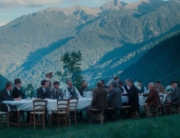
Rin Takanashi as Akiko (Sundance Selects)
![]() Abbas Kiarostami’s follow up to his tremendous Certified Copy could be considered its companion piece. Again, he’s working outside of his native Iran, this time forgoing the natural beauty and architectural history of Certified Copy’s Tuscany for the stark, impersonal urban landscape of Tokyo. The Japanese characters speak a language completely foreign to Kiarostami, a director with an affinity for passive exploration of his scenes. The entire film exists behind an opaque cultural mask, and the three main players are ripe for observation from a dispassionate audience’s standpoint. Kiarostami is like a sociologist, putting together a set of parameters and watching the characters play out their interactions.
Abbas Kiarostami’s follow up to his tremendous Certified Copy could be considered its companion piece. Again, he’s working outside of his native Iran, this time forgoing the natural beauty and architectural history of Certified Copy’s Tuscany for the stark, impersonal urban landscape of Tokyo. The Japanese characters speak a language completely foreign to Kiarostami, a director with an affinity for passive exploration of his scenes. The entire film exists behind an opaque cultural mask, and the three main players are ripe for observation from a dispassionate audience’s standpoint. Kiarostami is like a sociologist, putting together a set of parameters and watching the characters play out their interactions.
It’s a simple story with a few complications. Akiko (Rin Takanashi), a call girl, quarrels with her boyfriend, Noriaki (Ryo Kase), over the phone before taking a cab to meet a lonely widower on the other side of the city. The old man, Takashi, is a kindly chap who lives alone in a modest apartment with all the trappings of middle-income everyday Japanese life, up to and including a one-car garage and a nosy neighbor. Akiko is shy and disinterested, but has more going on emotionally beneath the surface. At first, we only meet her boyfriend through his voice on the phone—he doesn’t know her occupation, and he wonders where she is going.
Akiko and Takashi share a truncated sexual encounter in which Akiko is tired enough to slip right into his bed and fall asleep, and Takashi is too polite to do anything about it. Again, there is something emotional taking place between the two of them, but it’s well below the surface. On first thought, an audience might sense guilt. One is disloyal to her current boyfriend; the other to the memory of his deceased loved one. The following morning, however, the two begin a day of strange, unexpected role-playing: when Akiko’s boyfriend catches them together in public, she asks the old man to pretend that he is her grandfather—a callback to the imagined personas in Certified Copy, perhaps? In that film, the two main characters pretended to be husband and wife. This time around, though, there is a stark generational gap. The remainder of this slow moving but always compelling film is, again, a clinical observation of the odd character play that unfolds between three everyday people.
This is not a director that infuses a meaning into every frame. Far from it. Kiarostami instead prefers to allow an actor, and subsequently an audience, to find his or her own personal truth in the scenes. Thus, we may see guilt, but it is not necessarily a scene about guilt. We may see characters yearning for escape, but it’s not a film about that. Kiarostami never allowed the actors to see the full script, but instead asked them only to learn each day’s scenes. To an even further extreme, he told the not well-known Tadashi Okuno, who plays the old man, that his part was a very small one, using the actor’s sense of perspective to aid in the performance (without him even knowing it). And if he was hoping to guide Okuno into the modest, unassuming, intelligent fellow that we see in Takashi, without a trace of guile or preconceived judgments, then it was a very effective method.
Kiarostami is a rare breed: a truly academic filmmaker with a keen sensibility for how to engage an audience. He’s a naturally curious and energetic inquisitor, and he’s currently making some of the best work of his career. Like Someone in Love, and Certified Copy before it, is a heady, emotionally relevant film that will provoke intelligent thought for as many repeat viewings as one gives it. I recommend several.






Leave A Comment